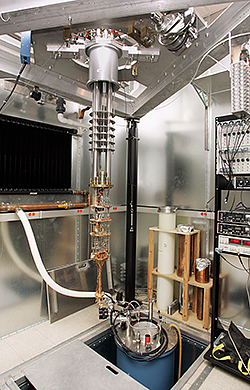Scientists Develop Method for Quantum Information Transfer
Researchers at Princeton University claim to have developed a new method to reliably read and transfer quantum information.
Get Tom's Hardware's best news and in-depth reviews, straight to your inbox.
You are now subscribed
Your newsletter sign-up was successful
The idea is apparently working on a small scale, but could enable a way to much larger quantum computing systems that could hold thousands or even millions of qubits.
Physicist Jason Petta said he and his team were able to leverage a stream of microwave photons to "analyze" a pair of electrons that were trapped in a quantum dot. The microwave stream, controlled by mirrors, allowed the scientists to read the information held by the electrons. The microwaves are changing depending on the spin state of the electrons.
Like other quantum bit research, this project also operates on a very small scale as the entire apparatus "operates over a little more than a centimeter". However, given the size of an electron, the scientists explained that their device is similar to controlling the motion of an object with two device where one is placed on the moon and the other on Earth.
In future research, Petta said that he would want to work on the reliability of the electron pair and then add more quantum dots and scale the system. "But to make use of the scaling, it needs to work a little better," he said. "The first step is to make better mirrors for the microwave cavity."
Contact Us for News Tips, Corrections and Feedback
Get Tom's Hardware's best news and in-depth reviews, straight to your inbox.

Wolfgang Gruener is an experienced professional in digital strategy and content, specializing in web strategy, content architecture, user experience, and applying AI in content operations within the insurtech industry. His previous roles include Director, Digital Strategy and Content Experience at American Eagle, Managing Editor at TG Daily, and contributing to publications like Tom's Guide and Tom's Hardware.
-
cats_Paw This means that we will be able to finally play online with no lag?Reply
If not... not really that important :D -
JBB-SaDo fuzzionIf you have to ask, you probably cant afford it.Reply
If you don't ask, you won't be able to afford it....
-
hoofhearted Trying for a piece of that IBM contract to analyze the massive radio telescope data.Reply -
freggo in 20 years my grandkids will have that in their cell phones (or phone implants).Reply
And they will complain about the slow speed, the high cost ($299 with contract -before inflation-) and the 2PB storage limit :-)
Gotta love science !
